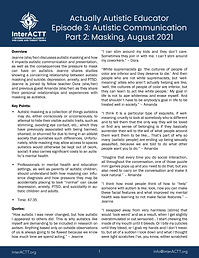Episode 4.5: Labels and Language of Autism: Person-First vs Identity-First
Language is important and can influence our perspectives of people. Many teachings in recent decades have focused on what is termed “person-first” language, where you say “person with x” instead of “x person.” For some diagnoses this is the preferred term, but there are many groups where it is actively rejected by the majority of members. In the autism community there is a strong preference for “identity first” language - I am autistic, not a person with autism, because my autism is an inherent part of who I am. We also look at other terms and the use of euphemisms such as “special needs” and do a brief feature on another famous autistic in popular culture, Tee Williams, writer for DC comics.
Episode 4: The Spectrum 10k Controversy and a History of Eugenics
This week a new project was announced in the UK called Spectrum 10k, with the goal to collect the DNA of 10,000 autistics for various research purposes. It is supported by several big names in autism research, but numerous autistics have raised serious concerns regarding the use of genetic testing to eliminate or cure autism, as well as regarding several of the researchers and groups associated with the project. This has resulted with #ActuallyAutistic and #StopSpectrum10k going viral as the autistic community has pushed back against this internationally. This episode details many of the concerns raised by autistics regarding the research and people involved, as well as looking into the history of eugenics against the disabled in the last century and currently occurring even today. Finally, we look at some ways to avoid these outcomes by creating more inclusive research teams and being willing to examine privilege and power dynamics present in academia.
Episode 3.5: Famous Autistics in Popular Culture
As a break from some of our heavier topics around ableism and the trauma autistics face, in this mini episode Jeanne (she/her) highlights some famous autistic actors, writers, and athletes (and a few wonderful autistic advocates who might not be famous but should be) to remind us that there are always autistic professionals in any field if you’re willing to find us. We then discuss the importance of including autistic voices in autistic-focused projects, from media to professional development trainings.
Episode 3: Autistic Communication Part 2: Masking
Jeanne (she/her) discusses autistic masking and how it impacts autistic communication and presentation, as well as the consequences the pressure to mask can have on autistics. Jeanne shares studies showing a concerning relationship between autistic masking and suicide, depression, anxiety, and PTSD. Jeanne is joined by fellow teacher Dora (she/her) and previous guest Amanda (she/her) as they share their personal relationships and experiences with masking as autistics.
Resources and Recommendations

AWN fournit une communauté, un soutien et des ressources pour les femmes, les filles, les personnes transféminines et transmasculines non binaires autistes, les personnes trans de tous les genres, les personnes bispirituelles et toutes les autres personnes de genre marginalisé. Le site Web comprend des ressources pour les autistes, les parents d'autistes et des informations détaillées sur l'autisme, en particulier du point de vue des personnes qui ne sont souvent pas incluses dans les stéréotypes autistes concernant le sexe, la race et l'âge.
Réseau des femmes autistes et non binaires (AWN)

Réseau d'auto-représentation des autistes
L'Autistic Self Advocacy Network est également sur Facebook et Twitter et cherche à faire avancer les principes du mouvement pour les droits des personnes handicapées en ce qui concerne l'autisme et à organiser la communauté autiste pour garantir que nos voix soient entendues dans la conversation nationale à notre sujet. Le site Web comprend un large éventail de ressources sur la recherche, le soutien et la communauté autistes.












